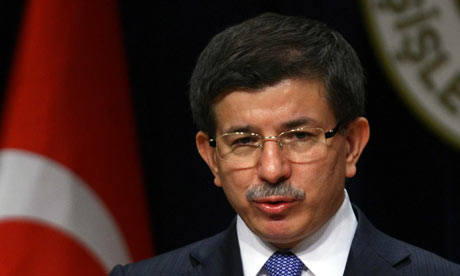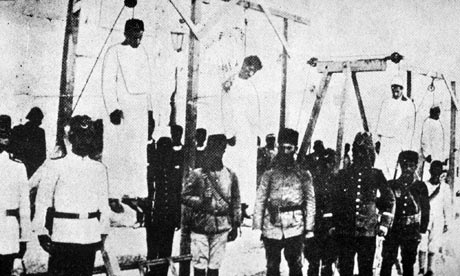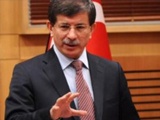Genocide Vote Harms Us-Turkey TiesFor the US house of representatives foreign affairs committee to decide that the killing of Armenians by Ottoman Turks in 1915 constituted genocide, as it did Thursday by a one-vote margin, would be acceptable and even praiseworthy if it were part of a serious historical effort to review all the great atrocities of modern history. But the singling out of Turks for censure, among all the killers of the 20th century, is something quite different. This vote was a triumph of emotion, a victory for ethnic lobbying, and another example of the age-old American impulse to play moral arbiter for the world.
Turkey recalled its ambassador in Washington immediately after the vote, which was broadcast live on Turkish television. The resolution now goes to the full House of Representatives. Given the pull of moneyed politics, and President Obama’s unwillingness or inability to bring Congress to heel on this issue, as Presidents Bush and Clinton did, it could pass. That would provoke much anger in Turkey, and might weaken the US-Turkish relationship at the precise moment when the US needs to strengthen it.
In the past few years, Turkey has taken on a new and assertive role in the Middle East and beyond. Turkey can go places, talk to factions, and make deals that the US cannot. Yet it remains fundamentally aligned with western values and strategic goals. No other country is better equipped to help the US navigate through the region’s treacherous deserts, steppes and mountains.
Would it be worth risking all of this to make a clear moral statement? Perhaps. What emerged from Washington this week, though, was no cry of righteous indignation. Various considerations, including the electoral power of Armenian-Americans, may have influenced members of Congress. It is safe to surmise, however, that few took time to weigh the historical record soberly and seek to place the Ottoman atrocity in the context of other 20th century massacres.
Two questions face Congress as it considers whether to call the 1915 killings genocide. The first is the simple historical question: was it or wasn’t it? Then, however, comes an equally vexing second question: is it the responsibility of the US Congress to make sensitive judgments about events that unfolded long ago? The first question is debatable, the second is not.
Congress has neither the capacity nor the moral authority to make sweeping historical judgments. It will not have that authority until it sincerely investigates other modern slaughters – what about the one perpetrated by the British in Kenya during the 1950s, documented in a devastating study that won the 2006 Pulitzer prize? – and also confronts aspects of genocide in the history of the United States itself. Doing this would require an enormous amount of largely pointless effort. Congress would be wiser to recognise that it does not exist to penetrate the vicissitudes of history or dictate fatwas to the world.
This vote has already harmed US-Turkish relations because it has angered many Turks. If the resolution proceeds through Congress, it will cause more harm. This is lamentable, because declining US-Turkish relations will be bad for both countries and for the cause of regional stability. Just as bad, the vote threatens to upset the fragile reconciliation that has been underway between Turkey and Armenia in recent months.
In this episode is encapsulated one of the timeless truths of diplomacy. Emotion is the enemy of sound foreign policy; cool consideration of long-term self-interest is always wiser. Congress seems far from realising this. . .
Genocide ruling harms US-Turkey relations | Stephen Kinzer
This article was published on guardian.co.uk at 00.28 GMT on Friday 5 March 2010
=================================================================
Open Letter to Stephen Kinzer, long time student of Turkish Affairs and the first New York Times Bureau Chief in Istanbul (1995-2000) and a great guy. Thursday 4 March 2009, Flemington, NJ – Saturday 6 March, Washington, NJ
Your article below was timely and has merits. However, I believe it is time for you to bite the bullet and declare to the world that the events of 1915 can not be labeled as genocide, which I believe you also believe deep in your heart, have but not stated openly in your article. So should Guenther Levy, who wrote an excellent book “Armenian gencide” but rather than stating the positive statement based on all the information presented in his definitive work, he referred to as “Disputed genocide.”. Now, a dozen concerned Turkish-Americans, led by a retired IBM Engineer and flier Sevgin Oktay have published a series of 4 page brochures on the falsifications by a number of Armenian organizations and individuals, which leaves the question to the reader whether it was a genocide or not. I believe it is time for these concerned people and the Turkish-Americans (146,000 according to the new Turkish Ambassador who was recalled to Ankara after the HCFA vote), to stop beating around the bush and face the facts and declare to President Obama, the prime mover of the, that the Armenians fired the first shot, pursued the establishment of a state of their own on lands where they were never the majority through rebellions, took arms against their own government and led uprisings and massacres of Turks, joined the Russian and French Forces even after 1915 when many returned to Turkey from Syria and the USA while hundreds and thousands stayed in the Caucauses, which most Armenians and their blind supporters do not want to talk about.
Who ever reads your article and other publications, and ponder on the question, they will probably answer, “Yes, it was a genocide”, just like the 23 members out of 46 led by a fanatic of the House Foreign Relations Committee did on March 4, 2009, a dark page on the US Congress history, probably because all their lives, they have been continuously exposed to the Armenian propaganda, who were elated by the one vote win. I am sure all of them must have visited the US Holocaust Museum in WDC which exhibits the fabricated Hitler statement on “Who remembers the Annihilation of Armenians” (visited by 2.5 million visitors every year,) and now the untruthful “Morgenthau Exhibit” at the Museum of Jewish Heritage in New York”, scheduled to run until the end of 2010, competing with Istanbul as the Cullture Capital of Europe 2010. If they have also read 1915 Ambassador Henry Morgenthau’s “Story Book”, and the Israeli Ambassador to US book on 230 year history of America without mentioning the Turkish contributions, Peter Balakian’s book “The Burning Tigris” and the play, “Beast on the Moon” being stage every year near April 24, how can they not answer “yes” to your question, not knowing the truth.
Probably the best authority in the world on the Armenian issue is Prof. Dr. Turkkaya Ataov, the retired Prof of International Affairs who has written more than 100 books and hundreds of articles about the Armenian issue and has given confrences all over the world, from the US to England to Australia, with genuine documents not faked and fabricated ones being used by most Armenian organizations, the last count according to the late Hrant Dink, over 26,000, some of which will be exposed as another brochure by the. I would humbly recommend that Prof. Ataov should appear on US Media and also, instead of asking a similar question on the Armenian issue, “What happened in 1915”, he too should state the truth about the Srmenian revolts that led to the re-location of Armenians, not deportations, as Turkish Ambassador namik tan erroneously stated in the 10 minute CBS program.
Many individuals and organizations are asking, “What next?” My humble recommendation would be to write to both House Speaker Nancy Pelosi not to bring the Resolution to the floor and to President Obama, to stop his support to the Resolution, and to the American people through lectures at Universities (one place would be the March 13, MIT Conference), appearnecs on TV and articels in the media.
Respectfully,
Yuksel Oktay
Open Letter to the Chairman Howard L. Berman and the 46 Members of the House Foreign Affairs Committee on, “Battle over History’’, aired by CBS 60 Minute, Feb. 28, 2010
Part III
February 28, 2010
Open Letter to Andy Rooney, the Commentator on CBS 60 Minute Program, on “Battle over History’’, aired by CBS 60 Minute, today, Sunday at 19:00 PM, Feb. 28, 2010
Andy Rooney,
CBS 60 Minute Commentator
New York, NY
Dear Mr. Rooney,
Your commentary at the end of the 60 Minute program today was excellent, as usual. You were right in questioning the wisdom of including all those questions in the 2010 Census Form. I don’t know if you watched the entire 60 Minute program, especially the segment called “Battle over History”, the 10 minute segment prepared by E. Goushon and Drew Moughathan, which was full of fabricated stories, distorted facts, and not a good one. In fact, it was a disgrace to TV journalism, in which CBS is good at. In fact, probably the best program on TV is the “Sunday Morning” originated by Charles H Kuralt who would neverallow the showing of a one sided story on his program. Just like you questioned the Cencus Form, I would like to question the allegations in the “Battle of History”, if possible, with your help, which was more like “ Battle over History with Fabrications, Forged Documents, and Armenian Distortion of Facts”
For years, 60 Minutes has been presenting excellent segments on many subjects that the public has cherished over and over again. I still remember the segment that was presented some years ago on Ahmet Ertegun, a Turkish-American and a music mogul who made Charles Ray famous along with many African-American musicians over the years. He is now buried in a small grave in Uskudar, Istanbul, but his contributions to the American society will never be forgotten.
The 10 minute segment “Battle of History “, was full of fabrications, forged documents and distorted facts, as a result of which, the truth was lost. In 10 minutes, the entire Turkish nation was convicted of a crime which has never been proven in an International Court. Peter Balakian made a new revelation that 400,000 Armenians died in , which is a fabrication. Many of the re-located Armenians did arrive in and all of them were given homes, land and money. Armenians were given an option to return to Turkey in 1916 and 1917, and many did, in fact some joining the French forces and fighting against the Ottoman Empire. The descendants of the re-located Armenians who chose to live in Syria and Lebanon make up a large portion of the 8 million Diaspora Armenians. These facts were not mentioned in the presentation.
Just one site was shown along the Euphrates, claiming that the bones were everywhere, which is questionable after 95 years. Perhaps they were just placed there for the program. The Turkish Ambassador Nabi Sensoy was not given an opportunity to tell the truth, since he appeared for less than a minute, and erroneouslyreferred to the re-settlement as deportations. The Hitler statement that Peter Balakian loves to state at every occasion is a total fabrication which has been proven to be false. The reference to genocide scholars is also distortion of facts since these people are self appointed individuals without any credentials to pass a judgament on what happened 95 years ago. The murder of Hrant Dink was condemned by everyone in Turkey when 100,000 Turks walked behind his coffin, including this writer.
The 10 minute segment was broadcast as a propaganda material to influence the 46 members of the House Foreign Affairs Committee before their vote on the fabricated Armenian genocide resolution on March 4, 2010. I will venture to say that, if they watched this segment, they will not believe all the falsifications and vote “NO” to the Resolution. Below is a letter that I sent to the members of the House Foreign Affairs Committee and I hope you too will read it. And I hope you will have a talk with Bob Simon who put this segment on 60 Minutes, tarnishing its reputation. It would be wise if CBS 60 Minute airs “Armenian Revolt”, a documentary made by an American, which tells the truth about the Armenian issue.
Respectfully.
Yuksel Oktay
Concerned American with Turkish Heritage and Past President,
Federation of Turkish-American Associations, NY (1973)
Saturday, 27 February 2010
Washington, NJ
 Foreign minister Ahmet Davutoglu says describing the 1915 Armenian killings as genocide is an insult to Turkey’s ‘honour’. Photograph: Adem Altan/AFP/Getty Images
Foreign minister Ahmet Davutoglu says describing the 1915 Armenian killings as genocide is an insult to Turkey’s ‘honour’. Photograph: Adem Altan/AFP/Getty Images








 whether they really want Armenia-Azerbaijan reconciliation- UPDATE
whether they really want Armenia-Azerbaijan reconciliation- UPDATE
 “Taraf” broke the Balyoz conspiracy theory on Jan. 22, 2010.
“Taraf” broke the Balyoz conspiracy theory on Jan. 22, 2010. Gen. Ibrahim Firtina, a former head of the air force, was questioned in court about a plot to overthrow the government.
Gen. Ibrahim Firtina, a former head of the air force, was questioned in court about a plot to overthrow the government. Prime Minister Recep Tayyip Erdoðan, President Abdullah Gul and Armed Forces Chief of Staff Gen. Ýlker Baþbuð met on February 25.
Prime Minister Recep Tayyip Erdoðan, President Abdullah Gul and Armed Forces Chief of Staff Gen. Ýlker Baþbuð met on February 25.